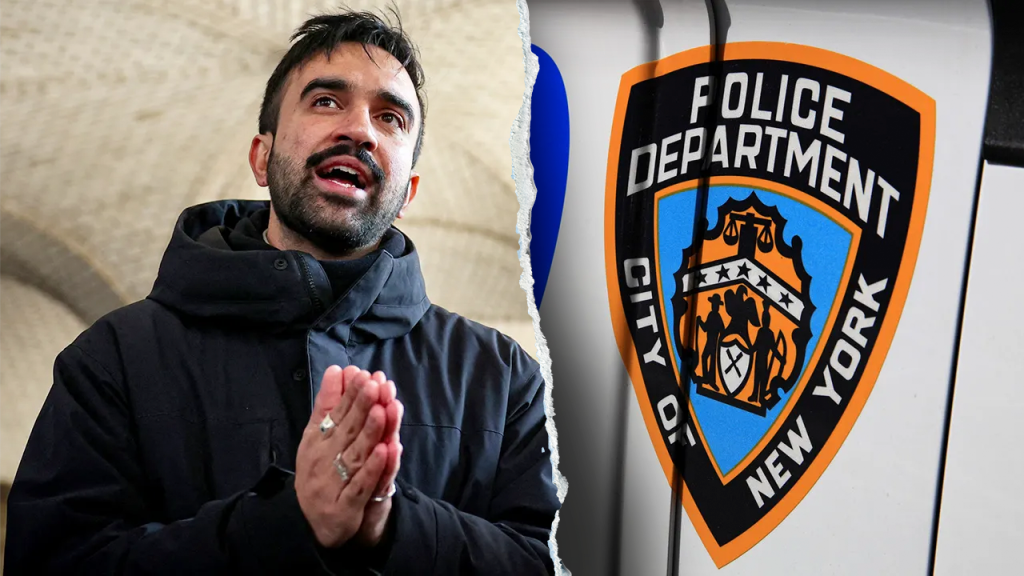NYC Socialist Mayoral Candidate Under Fire for Comparing NYPD to Israeli Military
In a political landscape where words carry immense weight, New York City socialist mayoral candidate Zohran Mamdani finds himself at the center of controversy following the emergence of a video clip from the Democratic Socialists of America’s 2023 national convention. The clip, which has since gone viral on social media, features Mamdani making a provocative comparison between the New York Police Department and the Israeli Defense Forces (IDF), stating: “We have to make clear that when the boot of the NYPD is on your neck, it’s been laced by the IDF.” This statement has ignited fierce criticism from various political figures, community leaders, and ordinary citizens, further complicating Mamdani’s already contentious relationship with law enforcement as he campaigns for mayor of America’s largest city.
The controversy adds to a growing list of statements for which Mamdani has faced criticism regarding his stance on policing. Previously, he had called for defunding the NYPD, describing the department as “racist, anti-queer and a major threat to public safety” – comments that compelled him to appear on Fox News to issue an apology amid significant backlash. When confronted about his recent IDF comparison during a press event in Hell’s Kitchen, Mamdani sidestepped directly addressing the controversy, instead pivoting to discuss his plans for working with police officers to address public safety concerns and tackle the department’s retention crisis. When specifically asked about maintaining the NYPD’s liaison office in Israel, he deflected by stating his focus was on the NYPD in New York, not overseas, leaving questions about his controversial comparison largely unanswered.
The social media response to Mamdani’s comments was swift and severe, with critics from across the political spectrum condemning his words. Clay Travis, founder of Outkick.com, bluntly called Mamdani “truly awful,” while NewsNation Host Batya Ungar-Sargon pointed out what she described as “textbook antisemitism.” Anti-Defamation League CEO Jonathan Greenblatt explicitly labeled Mamdani’s remarks as antisemitic, describing them as “twisted fear mongering and conspiratorial thinking.” The criticism extended to Capitol Hill, with Representative Claudia Tenney (R-N.Y.) characterizing Mamdani’s comments as “antisemitic, divisive, & dangerous,” suggesting the controversy has implications far beyond the New York City mayoral race and touches on broader issues of antisemitism and political rhetoric in American discourse.
Beyond his controversial statements, Mamdani’s proposed policies on policing have also drawn significant scrutiny. He has advocated for having social workers and “transit ambassadors” handle certain 911 calls instead of police officers, a position he has maintained since 2020. During a recent mayoral debate, Mamdani elaborated on this proposal, suggesting that 911 dispatchers should be entrusted to determine whether a situation indicates violence requiring law enforcement response. This approach has been met with professional skepticism, most notably from Joseph Giacalone, a retired NYPD sergeant and criminal justice professor at Penn State Lehigh Valley, who dismissed it as “the worst idea” he’s heard in some time, raising concerns about potential liability issues and the dangerous consequences of dispatchers making incorrect assessments about the need for police intervention.
The criticism of Mamdani extends beyond his specific policy proposals to questions about his fundamental approach to leadership in a diverse metropolis like New York City. Former New York Governor Andrew Cuomo directly criticized Mamdani as “divisive across the board,” specifically highlighting Mamdani’s characterization of the NYPD as racist. Cuomo emphasized that effective leadership in New York City requires unity rather than division, noting that “one of the main responsibilities you learn inherently as a governor, a mayor or an executive, is that you have to constantly be working to keep people together because they will separate and fight naturally.” This criticism strikes at the heart of what many view as a fundamental qualification for mayoral leadership: the ability to bring together diverse constituencies rather than driving them further apart through inflammatory rhetoric or divisive policy positions.
As the New York City mayoral race continues to unfold, Mamdani’s controversial comparison between the NYPD and the IDF serves as a reminder of how quickly statements made in political contexts can ignite broader debates about antisemitism, policing, and the appropriate role of law enforcement in urban communities. The controversy highlights the delicate balance candidates must strike between advocating for reform and maintaining respect for institutions and communities. For Mamdani, navigating this controversy presents both a significant challenge to his campaign and an opportunity to clarify his positions on policing, community safety, and his vision for leadership in one of the world’s most diverse and complex cities. Whether he can effectively address these concerns may well determine his political future in a city where public safety concerns remain paramount for many voters, regardless of their position on the political spectrum.













